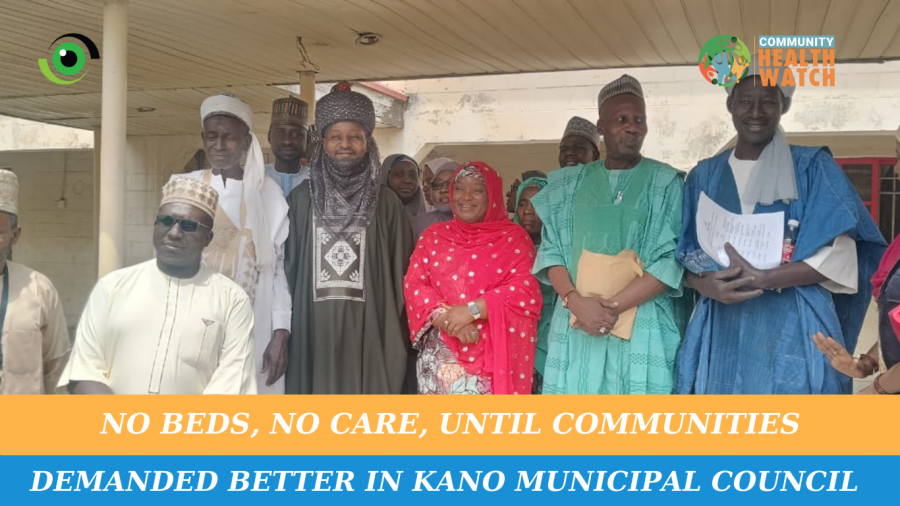
Imagine arriving at a health centre in labour, only to hear the words: “No beds available.” For many women in Kano Municipal Council (KMC) of Kano State, this nightmare is not a rare occurrence but a painful reality. Each year, countless mothers face rejection at facilities meant to safeguard their lives, leaving them to wonder if the hospital turns them away, where else can they go?
In December 2024, Nigeria Health Watch, in collaboration with Akin Savvy, organised a town hall meeting where many individuals shared their experiences accessing primary healthcare (PHC) services in KMC.
Aisha Kabir, a resident of KMC expressed her frustration about the indifference and poor practices of health workers. She highlighted the ongoing issue of bed shortages, noting that some health workers exploit residents by charging fees for bed allocation.
Absence of essential treatment supplies
However, another resident in attendance, Jamila Adam Ciroma, expressed concerns about the shortage of Plumpy’Nut, a United Nations Children Fund (UNICEF) supported Ready-to-Use Therapeutic Food (RUTF) for malnourished children, which she alleged are being diverted and sold within communities by health workers.
Image credit, Nigeria Health Watch
Significant changes have been made following measures taken by the ward development committee (WDC) to address misconduct and unethical practices of healthcare workers across these facilities, which were highlighted during the town hall meeting.
WDCs drive accountability
According to Tijjani Yawale, Chairman of the WDCs in Kano, reforms are underway especially regarding the absence of Plumpy Nuts. “After issuing stern warnings to health workers, we sent women to test the system. None were charged for bed space allocation or the Plumpy Nuts /RUTF. I can say all facilities now provide these services for free, and transparency in BHCPF enrolment has also improved by 95%.”
BHCPF enrolment transparency. Image credit: Nigeria Health Watch
Phone numbers of WDCs are now displayed on the walls of health facilities to ensure transparency.
Yawale also noted that the WDCs advocated for improved BHCPF enrolment of the residents of Kano Municipal Council, which is also currently being prioritised by Kano State Contributory Health Care Management Agency (KSCHMA).
“I have brought numerous women to give birth at that same facility since the town hall,” Aisha shared. “This time, we were received by the staff, and their attitude is totally different. But we still have issues with bed spaces, which remain insufficient.”
Improve WASH in the community
During World Toilet Day, in a sensitisation conducted by Akin Savvy, women like Aisha were surprised to discover that infections, even STDs, can be transmitted by poorly maintained toilets.
“I did not know,” she admitted. “Now, I buy a small disinfectant for ₦150, clean my bathroom, and wash my hands with soap whenever I use the toilet. It is now part of my routine.”
Residents demand for more
Although illegal sales of nutritional supplements have decreased, insufficient monitoring still allows some issues to continue. The Nigeria Health Sector Renewal Plan, through its second pillar, was designed to enhance infrastructure, strengthen human resources, ensure transparency in resource allocation, and promote community engagement toward achieving Universal Health Coverage (UHC). These efforts provide the necessary framework to turn town hall promises into lasting transformations.
Image credit: Nigeria Health Watch
To ensure trust and improved service delivery, policymakers and stakeholders should:
- Display BHCPF contact numbers clearly in PHCs and increase unannounced facility inspections to sustain accountability.
- Expand bed capacity and enforce fair allocation.
- Recruit more health care workers to meet the growing health needs of the people
“Townhalls are not enough,” Ciroma cautioned. “There should be unannounced visits to facilities. Let health workers know someone is watching.”
